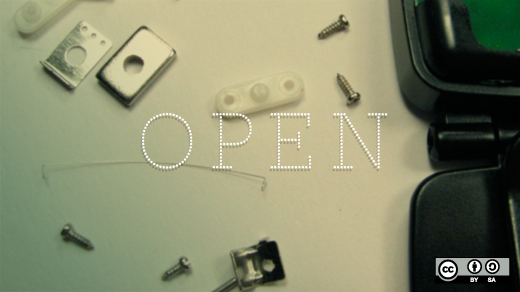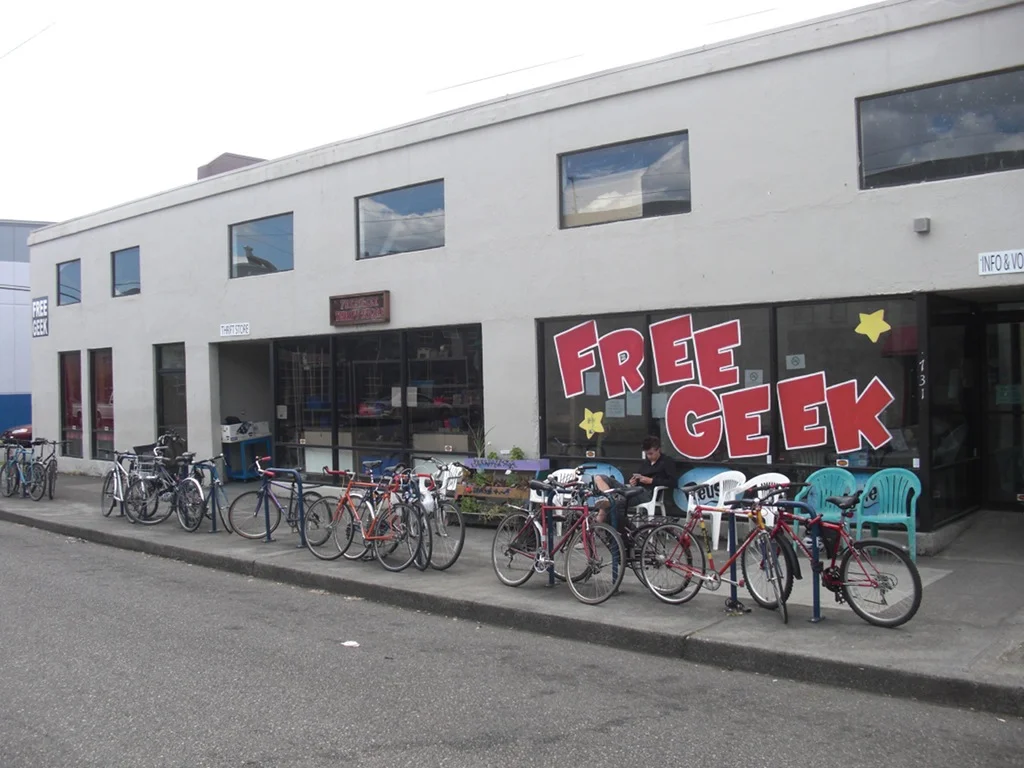Here in the District of Columbia, a loosely-knit group comprised of social workers, librarians, technologists, environmentalists, disability rights advocates, and educators has come together in the past few years. This coalition, known as the Broadband Bridge, sees digital justice and digital inclusion as a cornerstone towards self-determination in traditionally underserved communities.
Following the lead of like-minded groups in Detroit and elsewhere, the Broadband Bridge has piloted community-based wireless mesh networks, worked to provide greater access to an existing grant-funded broadband network and held DISCOvering TECHnology (Disco Tech) Fairs to encourage people to learn about the ways in which computers, video cameras, and other equipment can be used as tools to tell their stories, to take advantage of government services, to access employment and educational opportunities, and to lobby for social change in their communities.
Lately, an idea has been fermenting within the group to create a "digital co-op" which would offer a training program in hardware and software, combined with a hardware refurbishing / recycling center and a hackerspace / small business incubator. Several members of the Broadband Bridge found their way to the Free Geek website and thought it could provide a useful model for moving forward. A few of those involved were already familiar with the organization. In fact, in 2009, while working for the GEO Collective, local activist Jim Johnson penned Free Geek, a Computer Recycler: Testing the Limits of Reproducing Worker-Managed Enterprises.
As a long-time advocate of using free open source software (FOSS), particularly in education, I was also familiar, albeit at a distance, with Free Geek. As luck would have it, I had the opportunity to visit the Free Geek mothership a few months ago and gathered a bit more information regarding their current operation.
Free Geek headquarters
After running from the Allied Media Conference in Detroit, then back to DC for Wikimania 2012, I ended up in Portland, OR for OSCON 2012. Having never been to Portland before, I decided to stay a few days after OSCON had finished to sample its legendary "bikes, beers and books" culture. During the conference, I stopped by the Free Geek booth in the exhibit hall, where I received a warm reception. One of the volunteers at the booth suggested I could learn more by joining one of the regular volunteer orientation tours offered twice a day and then sit down with one of the regulars if I had further questions. So, one afternoon, I hopped on my trusty two-wheeled rental steed and, after several jaunts around town, I pedaled my way to Free Geek's headquarters for their 4:00 PM orientation tour. I arrived early enough to scout about a little before the tour.
Free Geek is located in the Inner Eastside Industrial District, near the heart of Portland, 1.6 miles almost due south of the Portland Convention Center. (So sayeth Google.) The area is similar in appearance to the aging freight yard / industrial wholesale district in northeast DC, though not quite as old. As is typical of much of Portland, plenty of bike racks were available in front of the building and they were being well-used when I arrived.
The Free Geek facility is considerably larger than I had anticipated. According to Administrative Services Manager, Richard Seymour, the main floor is 15,000 square feet, with additional space on another floor that includes offices and additional storage. All together, he estimated between 17,000 and 18,000 square feet.
While waiting for the volunteer orientation to begin, I observed a steady stream of donors bringing their unwanted electronics into the building via a "drop off only" entrance, where intake volunteers immediately began sorting and classifying the donations. The donors were then funneled into the "Receipts and Contributions" room from which they could exit directly onto the street after going through the requisite paperwork. This allowed for a very smooth, constant flow of hardware donation traffic without jams or bottlenecks.
After getting the lay of the land and chatting with some volunteers for a few minutes, it was time for the orientation tour. Our tour guide was staff member Omar Vargas who coordinates the Spanish programs at Free Geek. In addition to the Spanish programs themselves, I noted that there were brochures and class schedules available in both English and Spanish.
The Volunteer program
The volunteer program consists of the Adoption program and the Build program.
Adoption program
This group takes in donated computers and other electronics, breaks them down into component parts (if necessary), and classifies them as reusable, recyclable, or trash. The components are boxed then sent to the warehouse for the Build program or for recycling / disposal. Quoting Amelia Lamb, Free Geek's Reuse Program Coordinator: "In general, we reuse about 25% of the gizmos we receive and recycle about 75%. This is based on analyzing the computer systems alone. The actual percentage varies according to the type of gizmo. Also, in general, institutional donations have a higher reuse rate than individual donations."
After 24 hours of volunteer time in the Adoption program, volunteers receive a free computer with Ubuntu installed and a 2.5-3 hour class covering setup and basic usage of their new computer, as well as instructions on installing additional software such as software for viewing and listening to media that is encoded using proprietary codecs. The class is designed to be friendly enough to include people who have never used a computer before. Also, recipients receive one year of technical support—provided the system remains an Ubuntu system.
Build program
First, volunteers in the Build program begin with a 2.5-3 hour community-based IT class that introduces topics including:
- how to identify the basic components of a computer, (e.g. motherboards, hard disks and hard disk controllers, video controllers, and power supplies)
- the current specs for Free Geek machines (e.g. minimum acceptable memory and hard disk size)
- the proper methods of handling and disposing of the previous owner's data (e.g. destruction of hard disks, not starting computers that have not yet been erased, etc.)
Armed with that knowledge, volunteer builders then move on to Systems Evaluation where they examine hardware which has been dropped off, determining if there are any salvageable parts suitable for refurbished computers. Whenever possible, parts deemed non-refurbishable are further deconstructed for recycling. In order to "graduate" from Systems Evaluation to Quality Control (the next step), volunteers must pass their Systems Evaluation skills on to an incoming "freshman" in the Build program under the watchful eye of an instructor. In Quality Control, volunteers test computers built by other volunteers, making sure they're ready to go out into the world. After performing QC on five machines, they are ready to move into the actual "build" phase of the program.
Once they have successfully built five machines, they are eligible for the same benefits that are offered to the Adoption program volunteers: a computer with a year of free maintenance and the setup and basic usage class. As I understood it, diligent volunteers can expect between 60 and 100 hours to finish the Build program.
Donating built computers
Once built computers are ready, they are moved into the Donation storage area, where they fall into one of four categories:
- FREEKBOXes: computers for volunteers
- FG-PDX systems: the city of Portland has a special contract with Free Geek; these systems are donated by the city to be given away to Portland city residents and organizations, with preference given to K-12 students, or organizations that work with K-12 students.
- "Low End" and "High End" systems sold in the thrift store; open to the general public
In addition, Free Geek offers Hardware Grants to qualified non-profit organizations. Computers provided via hardware grants are taken primarily from the supply of completed FREEKBOXes and FG-PDX systems.
The site also contains a library with computers available for an hour at a stretch and technical books (mostly focused on Linux and other FOSS) which can be checked out of the library.
There is also a kitchen and, following OSHA standards, credit for volunteer hours includes a 15-minute break every two hours and a lunch break for shifts lasting longer than six hours. To keep track of volunteer hours and resource scheduling, as well as having a good sense of how many people are in the space at any given time (satisfying security / safety concerns), registered volunteers are given an ID number and required to sign in and sign out at either the Volunteers desk or the Receipts & Contributions desk.
There are 32 paid staff members, some of whom are part-time employees. In a given day, there are between 70-75 volunteer slots to be filled, though they're not always filled. Between staff, volunteers and library drop-ins, there are typically 80 people in the space, maxing out at around 100 occasionally.
A few questions for the Recycling Coordinator
- Darryl Kan, how does e-cycling fit into a sustainable business model as a revenue stream? Somewhat like the Oregon "Bottle Bill", the state of Oregon reimburses Free Geek for processing e-waste, including computers, keyboards, mice and monitors. Industry is held responsible for and pays the end-of-life costs. In the long term, companies are becoming more responsible for the full life cycle of equipment. (Amelia added that this was done through the Oregon E-cycles program, administered by the Oregon Department of Environmental Quality.)
- Do you have formal workforce training programs? Informally, yes. There has been discussion of a more formal model that Free Geek is working towards implementing. However, refurbishing smart phones and tablets isn't a realistic future and that impacts decisions about workforce training.
- How do you feel about / address the current shift to a post-PC mainstream and how does it affect your future? Free Geek is well aware of the shift and realizes that it is not in a position to refurbish some of the newer technologies.
- How has your governance model changed over the last few years and why? In July 2011, the workers unionized with Communications Workers of America. As a result, the former collective members have become "management" due to the union laws.
Recipe of mutual collaboration
Several organizations and individuals working in the District of Columbia have all independently been converging on the idea that many of our technology challenges can be met via mutual collaboration in an open source way that is both pleasant and productive. The success of Free Geek in Portland has inspired other cities to try emulating the Free Geek model with varying degrees of success. The bylaws and other governing principles and philosophies found on Free Geek's wiki offer a recipe for moving forward to groups like the DC Broadband Bridge. Seeing those principles in action first-hand was quite inspiring, renewing my enthusiasm and conviction that such progress is indeed possible.








6 Comments